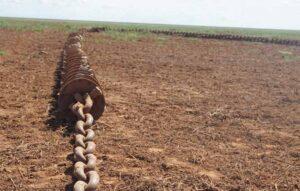Stopping Colleges’ Land Grabs: Farmers and Faculties Unite
Grassroots International is supporting our partner The Social Network for Justice and Human Rights (Rede Social) and our allies like GRAIN in a global campaign to stop violent and illegal land grabs at their source: the massive financial investments of pension funds and college endowments.
Paradise, Poisoned and Stolen
The Cerrado of Brazil is the most biodiverse savannah on Earth; its mosaic of high plateaus and lowlands hold 5% of the planet’s species. Over 10,000 species of plants, including 4,000 found nowhere else in the world, cover this region south of the Amazon. It’s big too. It makes up more than one-fifth of Brazil’s entire landmass.
It has also been home.
“People see it as empty space, but there are hundreds of communities that have been living there for hundreds of years,” said Maria Luisa (Maisa) Mendonça, director of Rede Social. Rede Social, along with our grantee the Pastoral Land Commission (CPT), have organized to defend these communities’ rights.
Keeping with tradition, these small-holder farmers, Indigenous Peoples, and Afro-descendant Quilombolas have lived in close harmony with the fertile land around them. They have settled in the lowlands and grow crops on and share the plateaus communally.
But then the land grabbers came, flush with cash.

Agribusiness’s demands for land increased over the past several decades of the “Green Revolution”. By the mid 1990s, soybeans and other cash crops had encroached into the Cerrado and with them came violence. Agribusiness employees and outsourced thugs have forged documents (making deeds seem older to fool the courts), abruptly fenced in the plateau land, and even murdered farmers who refused to leave where their families have lived for generations.
“Often, they’ll just destroy the houses when the residents are not around,” Devlin said.
Cash Flows
As the land grabbers’ funds grew, the locals’ problems grew with them. After the financial crash of 2007-2008, billions more corporate dollars flowed to land speculation as a safe and profitable investment. But as investors sought “safe” bets, they drove even more violent, illegal land grabs.
Harvard University was among these investors, putting $1 billion of its $37.1 billion endowment into farmland around the world. Adding to the harm, it partnered with one of the most violent and notorious land grabbers in Brazil, Euclides de Carli. The university now owns some 740,000 acres in Brazil, nearly the size of Rhode Island.
Harvard has hidden its responsibility in a series of shell companies. Combing through hundreds of pages of financial statements, GRAIN and Rede Social were able to piece together Harvard’s ownership schemes.
“You find the subsidiaries here, who’s behind that company. That’s where you get the story, that’s how you find what happened,” GRAIN researcher Devlin Kuyek said. The work of Rede Social, its connections to the communities on the ground, were essential in finding the exact plots of land Harvard and pension funds like TIAA stole.
Yet the crimes don’t end with the grab. While some land has sat idle, agribusiness has used the rest for monocropping.

Agribusiness is systematically clearing the beautiful and biodiverse Cerrado. Developers run giant chains, at least fifty feet long and covered in blades, across the plateau ground, tearing up everything in their path. And the poisonous pesticides and agrochemicals seep into the lands and waters in the lowlands where people still live.
“It’s a question of what kind of food system we want to have,” Maria Luisa said. “When you have monocropping, you have to destroy everything else.”
Actively Funded Destruction
Harvard College senior Isa Flores-Jones spent last summer working at an non-governmental organization in Mexico City. She organized with communities to help stop proposed oil pipelines: corporations were stealing locals’ land and poisoning their water, and the locals were fighting back.
Little did Isa know, however, that her school was engaged in the very same crimes around the world.
“It was shocking to hear Harvard had actively displaced communities from their land,” Isa told me. “That the university is actively funding the destruction of communities and ecosystems.”
As Divest Harvard’s campaign coordinator, Isa had fought Harvard Management Corporation to pause its direct oil, natural gas and coal investments in 2017. But while that victory was important, the university continued to profit from other dirty, and bloody, means.
“People don’t realize that Harvard has this enormous corporate side to it, that is actively pursuing these human rights and environmental violations,” Isa said. They do this “even as they claim to be doing research and policy work to reduce those negative impacts. It makes them an enormous hypocrite.”
Hope in a Campaign
Thankfully, Harvard’s hypocrisy is being exposed; the international campaign to end land grabbing is growing.
It starts with the people on the ground: the small farmers, Indigenous People and other traditional communities defending their land. With the support of Rede Social and CPT, they have fought in the courts and organized their communities. Thanks to their work, a Piaui judge recently cancelled 200 land titles held by grabbers.
In living in the belly of the beast, people in the US have an important role too: solidarity. We need to pressure colleges like Harvard and pension investment firms like TIAA, through public protest, petitions and education campaigns. We also need to provide the critical financial and organizing support to the social movements in the Cerrado so they can continue their struggles on-the-ground. That’s where Grassroots International comes in.
« Grassroots International is unique because of your particular commitment to movement-building,” Maisa told us. “You’re very special. »
“There’s an inspiring wave of resistance, and super-interesting alliances, which are supported by Grassroots International,” Devlin said. “That gives us reason to be optimistic.”

